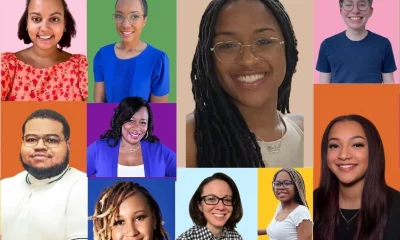Florida
Top LGBTQ-supporting companies bankroll politicians behind Fla. ‘Don’t Say Gay’ bill
Comcast/NBC Universal among donors
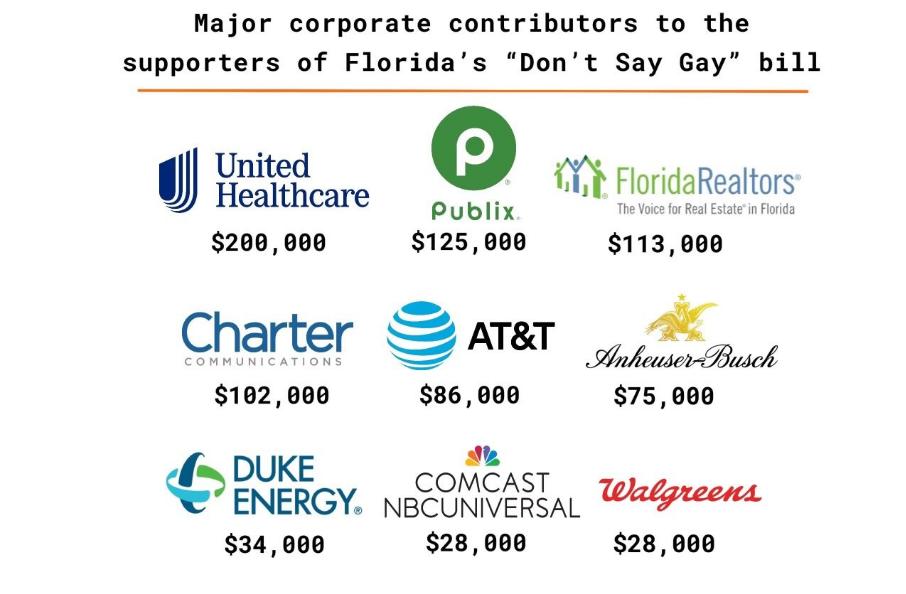
Some of the top companies in the U.S. that show public support for the LGBTQ community have donated thousands of dollars to the politicians behind a piece of Florida legislation opponents deemed the “Don’t Say Gay” bill.
The bill, which has versions in both the Florida House and Senate, would ban classroom discussions about sexual orientation and gender identity that are not “age-appropriate” in schools — though it is not clear what is considered “age-appropriate.” It also includes a provision that could effectively “out” LGBTQ students to their parents without their consent.
Despite opposition from Democrats and LGBTQ rights advocates, the “Don’t Say Gay” bill is gaining momentum in the Republican-controlled Florida Legislature.
Two weeks ago, Florida Republican Gov. Ron DeSantis appeared to voice support for the “Don’t Say Gay” bill, saying at a press event that it was “entirely inappropriate” for teachers and school administrators to have conversations with students about their gender identity.
“I know the ramifications of a bill like this could be detrimental to our LGBTQ youth,” out Florida state Senate candidate Eunic Ortiz told the Washington Blade.
Yet, a recent investigation from Popular Information, a political Substack newsletter run by veteran progressive journalist and political staffer Judd Legum, found some of the nation’s top companies — like Comcast/NBC Universal, UnitedHealth Group, Duke Energy, AT&T and Walgreens — have donated to the politicians behind the “Don’t Say Gay” bill.
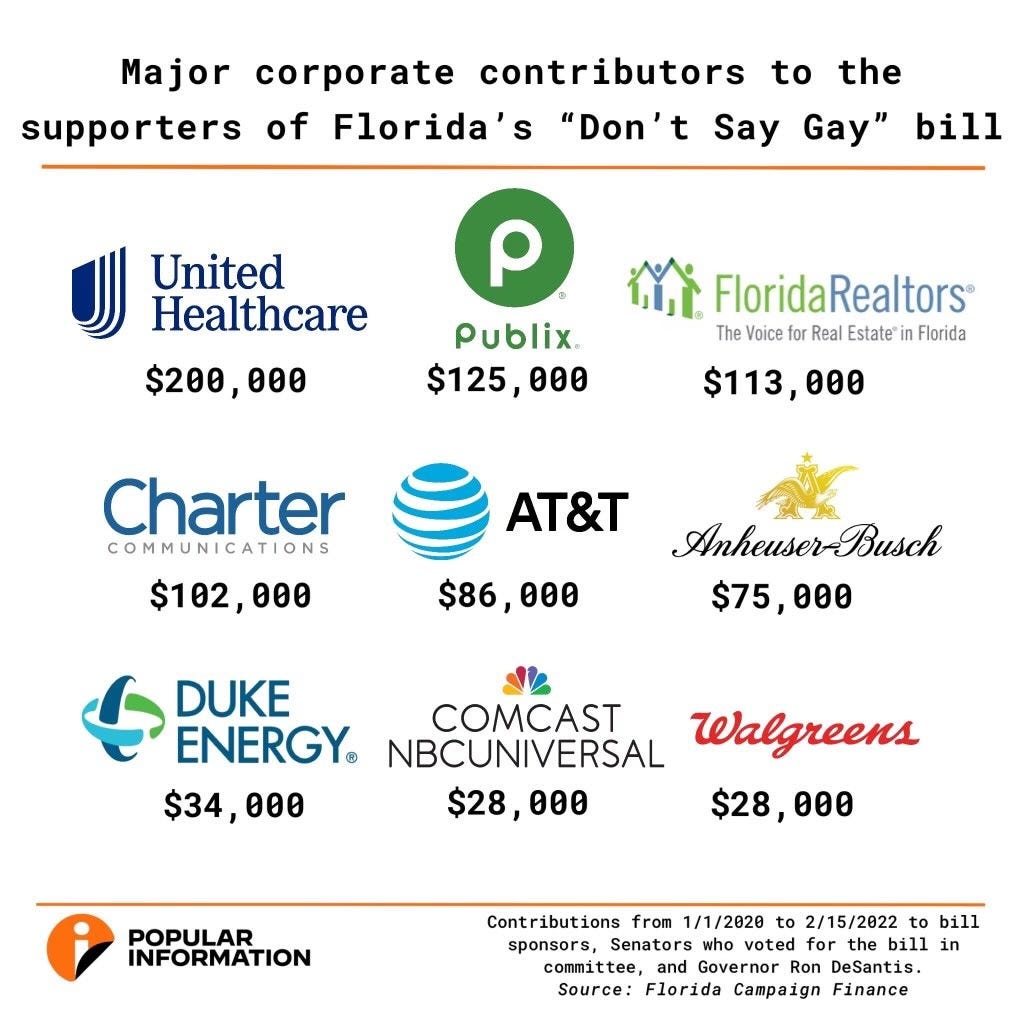
Comcast/NBC Universal, for example, donated $1,000 to state Sen. Dennis Baxley, the main sponsor behind the bill in the Senate. In addition, the company gave a total of $28,000 to the top supporters of the anti-LGBTQ legislation since 2020, according to Legum and two other reporters, Tesnim Zekeria and Rebecca Crosby.
The Blade reached out to several representatives at Comcast but did not immediately receive a response, nor did Popular Information.
Comcast has publicly supported the LGBTQ community in recent years. “Some people may think the LGBTQ rights journey is done and the struggle is over, but it isn’t. Our job is to continuously educate,” said Yvette Miley, senior vice president of MSNBC and NBC News, on its website.
UnitedHealth Group has donated at least $200,000 to DeSantis since 2020 despite his public support for the “Don’t Say Gay” bill and other anti-LGBTQ legislation, according to the article.
The healthcare company has received perfect scores from the Human Rights Campaign, the nation’s largest LGBTQ organization, Corporate Equality Index. Its chief talent officer, Ryan Craig, has also said, “Strengthening the sense of community among our LGBTQ+ employees and allies” makes the company stronger.
UnitedHealth Group did not immediately respond to the Blade’s request for comment. Public Information’s request also went unanswered.
Duke Energy, one of the largest electric companies in the U.S., has donated $34,000 to Florida legislators behind the “Don’t Say Gay” bill since 2020, including $25,000 to DeSantis and $1,000 to Baxley, according to the investigation.
The company has also received perfect scores from the HRC’s Corporate Equality Index.
“We are guided by our vision of an inclusive environment where employees feel a sense of belonging,” Cameron McDonald, Duke Energy’s vice president and chief diversity and inclusion officer, said in a statement. “We make sure to integrate diversity and inclusion into everything we do.”
The Blade attempted to reach Duke Energy representatives by phone and email but have yet to receive a response. Legum’s team also couldn’t contact the company for comment.
AT&T has donated $86,000 to the politicians behind the bill, including $80,000 to DeSantis and $500 to Baxley, Popular Information reported.
The company has supported the LGBTQ community on social media, partnering with the national LGBTQ youth suicide group the Trevor Project during last year’s Pride month.
“At AT&T we understand that unity starts in our own community, and we are committed to being a company that recognizes, embraces, and standings with LGBT+ people,” it said in a statement.
Warner Media, the company that owns AT&T, did not immediately respond the Blade’s request for comment.
Walgreens has donated at least $28,000 to DeSantis and four lawmakers who have voted in favor of the bill, according to Popular Information.
For Pride 2021, Walgreens Boots Alliance, its parent company, said it “created and encouraged everyone … to use a special Pride month background when they appeared on video during meetings to express their allyship.”
The company also did not respond to the Blade’s request for comment.
Read the full story here.
Florida
Professor at Baptist university in Virginia found dead in Florida gay sauna
Orlando police say cause of death undetermined

A beloved professor of psychology at Averett University, a private Baptist university in Danville, Va., was found dead on March 16 of unknown causes at the Club Orlando, a popular sauna and bathhouse for gay men located in Orlando, Fla.
University officials said David Hanbury, 37, an Associate Professor of Psychology who taught at the university since 2015, was in Orlando attending a conference of the Southern Psychological Association and had initially been reported missing by family members before he was found deceased.
Orlando police told USA Today the cause of death had not been determined but the death “does not appear suspicious at this time.” USA Today reports that police said their investigation into the death was “active and ongoing.”
A spokesperson for the Orange County, Fla., Medical Examiner told the Washington Blade it would take about 90 days for the completion of blood work and toxicology tests to confirm the cause of death in a case like this, where there were no obvious signs of injury or illness.
Cassie W. Jones, Associate Vice President of University Marketing and Communications at Averett University, declined to disclose whether Hanbury self-identified as gay in response to an inquiry from the Blade
“As an employer, we cannot comment on our employees’ personal matters,” Jones said. But when asked if the university would have continued to treat Hanbury with respect and support his tenure at the university if he had come out as gay, she said “absolutely” in an email response to Blade questions.
“Dr. David Hanbury was a dear professor, colleague and friend whose influence was far reaching,” Jones said in a March 21 message to the Blade, “We send our affection, condolences, and prayers of support to Dr. Hanbury’s family, friends and all others upon whom he had a lasting impact.”
The Averett University website shows that it has a policy of nondiscrimination that includes the categories of sexual orientation and gender identity among other categories such as race, religion, and ethnicity. The website also shows that the university has an LGBTQ student group called the Gender and Sexuality Alliance or GSA group.
Jones said the admiration and longstanding support of Hanbury from his fellow professors and students was reflected in a March 18 memorial gathering for him on campus.
“Nearly 250 students, faculty, staff, and community members joined as one Averett family, united in grief and sorrow, as we gave thanks for the remarkable life and influence of Dr. Hanbury on our lives and on the University,” Jones said.
“Averett University is committed to inclusion and belonging for all who learn, work and visit our campus,” Jone told the Blade. “Openness and inclusivity are embedded in our institution’s core values, and we know our diversity makes us stronger.”
The Baptist Standard, an independent newspaper that reports on the Baptist Church, reported in a May 9, 2011, story that the Baptist General Association of Virginia severed ties with Averett University in 2005 over a disagreement with the university’s position on homosexuality. Other news reports at the time said the Baptist organization objected to the university’s support for a gay student group.
Jones, in her message to the Blade, said Averett University currently “is a part of the Baptist General Association of Virginia family of educational partners.” She added, “We are aligned in our commitment to meet students wherever they are in their faith journey, and welcome those of all faiths or no faith.”
Florida
Settlement and clarification reached in Fla. ‘Don’t Say Gay’ law
Republican Gov. Ron DeSantis signed statute in 2022
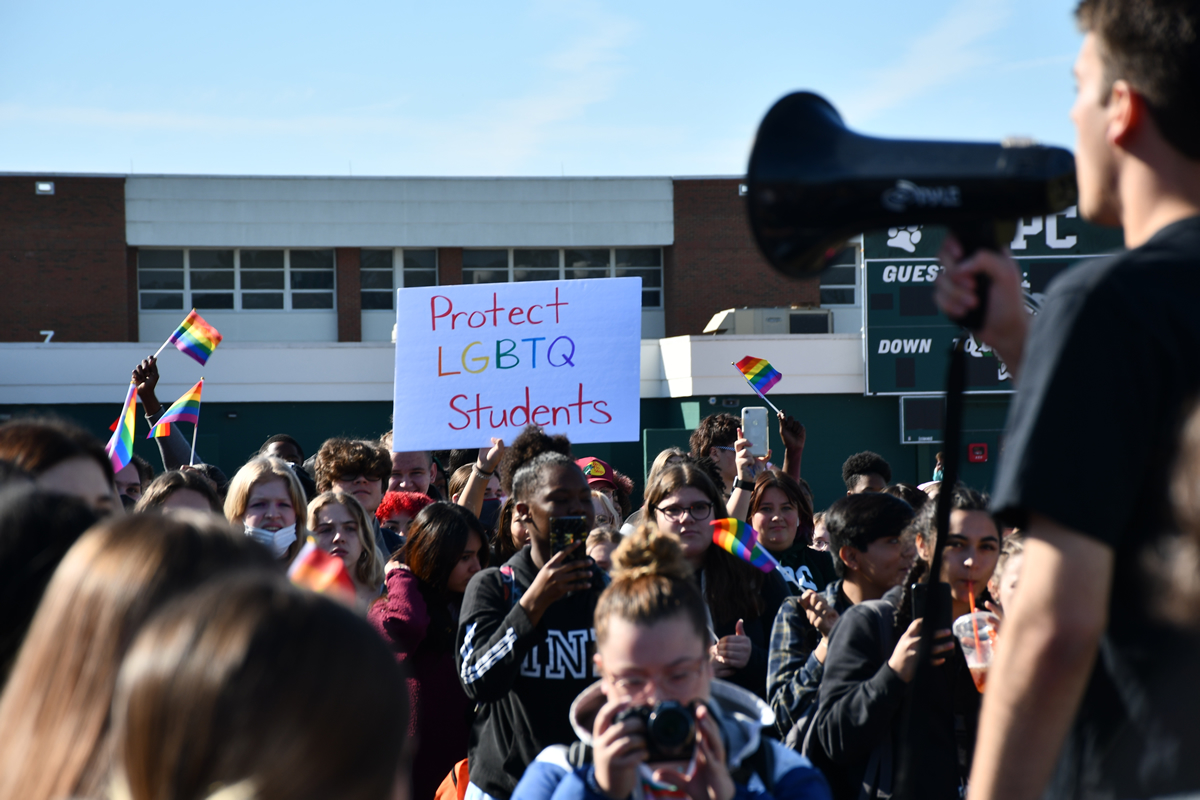
A settlement reached with the Florida State Board of Education, Florida Department of Education and various school districts and the attorneys and plaintiffs clarifies what is allowed in Florida classrooms under the state’s controversial “Parental Rights in Education” law colloquially referred to as the “Don’t Say Gay” law.
The plaintiffs’ lawyers at Kaplan Hecker & Fink LLP and the National Center for Lesbian Rights filed the agreement with the 11th U.S. Court of Appeals on Tuesday. The agreement effectively nullifies the most dangerous and discriminatory impacts of the law, and makes clear that the law must be applied neutrally and is no license to discriminate against or erase LGBTQ+ families.
Cameron Driggers and Jack Petocz, who led the statewide student protest against the ‘Don’t Say Gay’ law in March 2022, reacted in a text message to the Washington Blade saying:
“LGBTQ+ students and allies are breathing a sigh of relief today in response to the news that litigation has successfully mediated some of the most extreme aspects of Gov. DeSantis’ ‘Don’t Say Gay’ legislation. Just about two years ago, we led a statewide school walkout all across the state of Florida in response to that bill. We knew then that it infringed on the basic civil liberties of students and teachers and we look forward to future challenges to other pieces of authoritarian legislation.”
“The settlement restores the ability of students, teachers and others in Florida schools to speak and write freely about sexual orientation and gender identity in class participation and schoolwork,” the legal teams noted in a statement. “It also restores safeguards against bullying on the basis of sexual orientation and gender identity, and reinstates Gay-Straight Alliances (GSAs). Critically, the settlement also requires the State Board of Education to send today’s agreement to every school district, and to make clear that the settlement reflects the considered position of the state of Florida on the scope and meaning of this law.” the statement continued.
Specifically, the historic settlement agreement clarifies the following:
- Classroom references. The law does not prohibit references to LGBTQ+ persons, couples, families, or issues, including in literature, in classroom discussion (such as student-to-student speech or teachers responding to students’ questions), in students’ academic work product or teachers’ review of the same, in teachers identifying same-sex or transgender spouses or partners, or in any other context in which a teacher is not “instructing” on the subject of sexual orientation or gender identity.
- Nondiscrimination. The law does not target LGBTQ+ persons, couples, families or issues. Rather, it requires neutrality and prohibits “classroom instruction” on the subjects of sexual orientation or gender identity, whether the subject addresses heterosexuality, homosexuality, bisexuality, cisgender identities, transgender identities or otherwise. It would violate the law, then, to instruct that heterosexuality is superior to other sexualities, or that cisgender identities are superior to transgender identities.
- Anti-bullying and acceptance. The law does not prohibit instruction or intervention against bullying on the basis of sexual orientation or gender identity, nor does it require the removal of safe space stickers or elimination of safe space areas for the benefit of LGBTQ+ persons.
- Extracurricular activities. The law does not prohibit Gay-Straight Alliances, including student attendance or participation by teachers or other faculty members. The law also does not prohibit book fairs that include LGBTQ+ focused books, musicals or plays with LGBTQ+ references or characters, participation and expression by LGBTQ+ persons in other extracurricular events like school dances, or the wearing of clothing that is affiliated with LGBTQ+ persons or issues or that does not conform with one’s perceived gender identity.
- Library books. The law does not apply to library books, so long as those books are not being used in the classroom to instruct on the subjects of sexual orientation or gender identity.
- Third parties. The law does not apply to non-school-personnel, including parents, other family members, and guest lecturers, so long as the school is not delegating to such third party the role of providing classroom instruction on the subjects of sexual orientation or gender identity.
“We made a promise to LGBTQ+ families, students and educators across the state to ensure that they received equal dignity under the law, and to protect our schools from a censorship agenda that harms the education system as a whole,” said Equality Florida Executive Director Nadine Smith. “Florida has already endured nearly two years of book banning, educators leaving the profession and safe space stickers being ripped off of classroom windows in the wake of this law cynically targeting the LGBTQ+ community. This settlement is a giant step toward repairing the immense damage these laws and the dangerous political rhetoric has inflicted on our families, our schools and our state. The message to school districts, superintendents and teachers alike is clear: Protect every student and respect every family.”
In early 2022, Republican Gov. Ron DeSantis signed House Bill 1557, commonly known as the “Don’t Say Gay” bill. The plaintiffs sued the next day, alleging that the law was impermissibly vague, was obviously motivated by hostility to LGBTQ people and families and created an enforcement system that enabled discrimination and discouraged efforts to fight it. The plaintiffs claimed that the law violated their rights to equal protection, due process, and free speech. The plaintiffs litigated aggressively, and engaged in months of negotiations with the state’s lawyers to forge Monday’s historic settlement.
“This settlement is a huge victory for our community, both in Florida and nationally. It not only reverses the censorship and intimidation created by Florida’s ‘Don’t Say Gay or Trans’ law, it codifies important new protections that were not previously clearly established, such as the right of teachers and staff to talk about LGBTQ people, to put safe space stickers in their classrooms, and to be open about their own LGBTQ identities or same-sex partners, just as straight teachers are able to be,” said NCLR Legal Director Shannon Minter in a phone statement to the Blade. “I am thrilled to be part of this historic moment, which is a strong sign that the tide of anti-LGBTQ hatred and persecution is turning, thanks to the hard work of so many.”
Human Rights Campaign National Press Secretary Brandon Wolf issued the following statement:
“This is more evidence: The tide is turning on the anti-LGBTQ+ agenda. In state legislatures and courtrooms in Florida and beyond, discriminatory policies are starting to collapse. The DeSantis administration was forced to acknowledge that their vague, broad law was having sweeping consequences. And this settlement makes clear that every student deserves a safe, welcoming school environment where their families are treated with the respect that they deserve — and that what applies to LGBTQ+ people must apply to others equally. Thank you to the legal team and courageous plaintiffs for challenging this discriminatory law.”
Florida
Fla. DMV: ‘Misrepresenting’ gender on drivers licenses is fraud
HRC, Equality Florida condemn decision to rescind previous policy
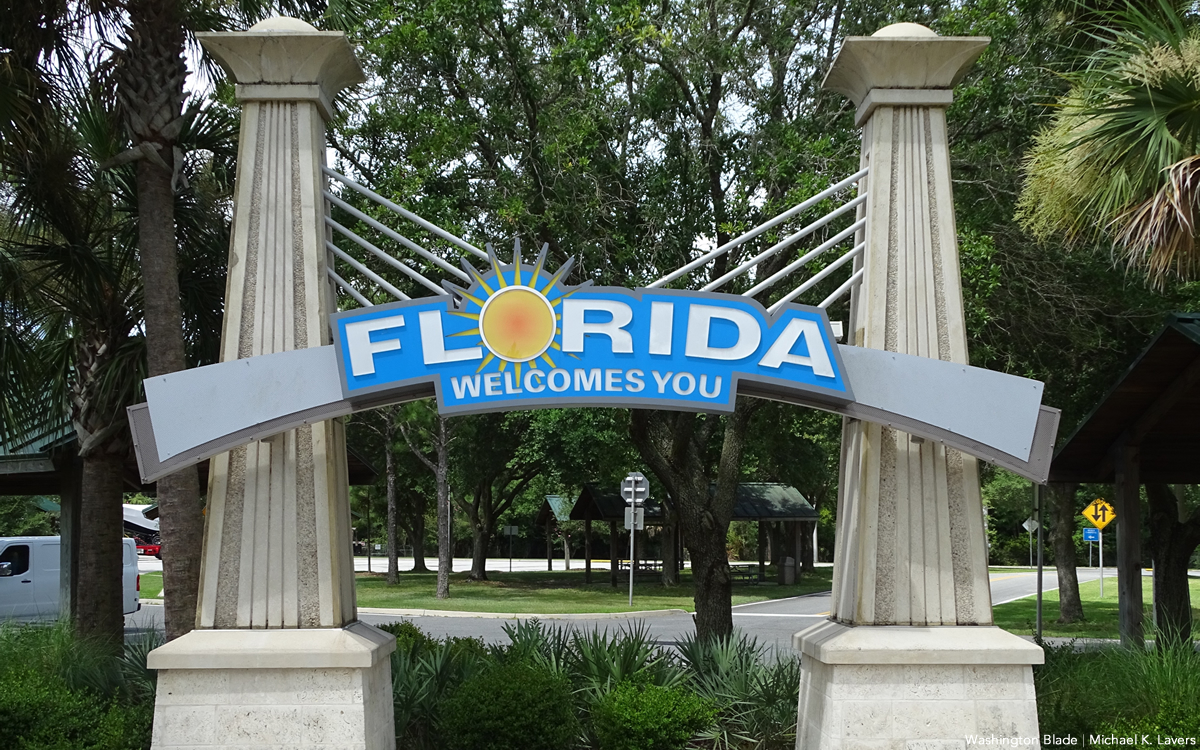
BY ERIN REED — According to a letter submitted by an anonymous source on Monday, the Florida Department of Highway Safety and Motor Vehicles has rescinded the policy that allowed transgender individuals to update the gender marker on their driver’s licenses.
The letter, written by Deputy Executive Director Dave Kerner, states that gender will be interpreted as “biological sex.” Furthermore, the letter declares that any person “misrepresenting” their gender marker would be guilty of fraud, facing civil and criminal penalties and revocation of licensure.
The letter, apparently sent out on Jan. 26, asserts that “gender” is synonymous with “biological sex,” and argues that gender identity is “neither immutable nor objectively verifiable.” It suggests that permitting trans individuals to update their gender markers on their driver’s licenses would “prevent the state from enforcing its laws.” These laws include bans on trans individuals using the bathroom of their gender identity and laws targeting adult medical care.
You can view the full copy of the letter here:
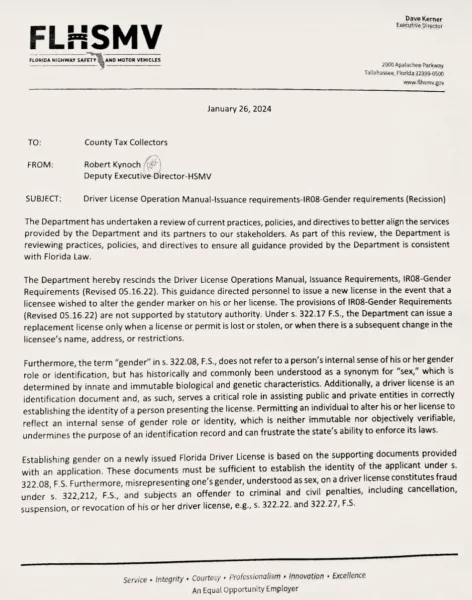
The move marks a significant escalation and seems to have been initiated unilaterally by the department. This action is in line with other unilateral measures taken by the executive branch in Florida and other states. These include the Florida Board of Medicine’s ban on trans care, Virginia Gov. Glenn Youngkin’s directive through the Board of Education to ban trans bathroom usage in schools, and Missouri Attorney General Andrew Bailey’s efforts to target adult trans care via the rule-making process. However, none of these examples previously involved driver’s licenses. If upheld, Florida would become the first state to prohibit driver’s license changes under criminal penalty for trans individuals.
The ramifications of this rule could be far-reaching. All trans individuals in the state with Florida driver’s licenses not aligning with their “biological sex” might immediately be in possession of a fraudulent license. The state could seek to suspend or revoke the licenses of trans individuals under this policy. Moreover, during traffic stops involving trans individuals, they could face legal challenges with police officers if the officers believe the driver’s license “misrepresents” their “biological sex.”
State Rep. Anna Eskamani appeared to confirm that computer systems were no longer accepting gender changes at FLHSMV offices:
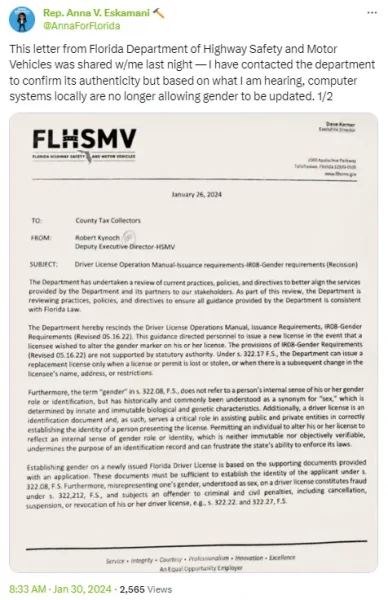
This development coincides with the consideration of two bills in Florida that aim to prohibit driver’s license changes through the legislative process: House Bills 1233 and 1639. These bills could require all Floridians to sign “biological sex affidavits” when renewing or updating their driver’s licenses. The policy could be a strategy to deter trans Floridians, aware of the bills, from quickly updating the gender marker on their driver’s licenses before their passage. Notably, Florida driver’s licenses typically have long expiration periods, often lasting eight years post-issuance.
Under this policy, trans individuals in Florida could face considerable challenges in daily life. Many have already left the state, and of those remaining, 80 percent reportedly wish to leave. This policy could instantly criminalize trans individuals who drive in the state with updated gender markers. It would compel trans people to disclose their identity in any situation requiring a driver’s license. Additionally, it would provide Florida a means to enforce its bathroom laws, which criminalize trans individuals for using bathrooms that align with their gender identity in many public spaces.
Nadine Smith, executive director of Equality Florida, issued the following statement:
“The DeSantis administration’s obsession with scapegoating transgender Floridians has escalated into an outrageous attack that further erodes freedom and liberty in our state. This cruel policy threatens transgender Floridians with civil and criminal penalties and blocks them from obtaining the critical government-issued identification necessary to continue their daily lives. Transgender people have always existed in every culture on every continent and always will. In Florida, tens of thousands of people have legally updated their gender marker on their driver’s license or ID. They carefully followed the rules to ensure their identification accurately reflects who they are, and they trusted this process. Now, an abrupt policy reversal has thrown their lives into chaos. The cruelty of this kind of government overreach and intrusion should alarm every Floridian. These reckless and hateful policies are intended to make the transgender community feel unsafe and unwelcome in Florida and to bully them out of public life entirely.
We know this is a devastating development, and we are working with our coalition partners, our grassroots volunteers, and our legal groups to figure out what options are available to fight back.”
The Human Rights Campaign reacted to this latest attack on the rights of trans Floridians in an emailed statement by HRC President Kelley Robinson:
“For years, transgender people have warned of radical anti-LGBTQ+ forces’ true aim: to abuse governmental power to take away our freedoms and drive trans people out of public society,” said Robinson. “From AG Paxton hunting for private medical information of transgender children, to Florida’s assault on identification documents, to Midwest lawmakers saying the quiet part out loud, these right wing extremists are no longer hiding the ball. They want to humiliate, harass, and use policy to eliminate transgender people from public life. But you cannot legislate away the community. Transgender people are powerful. They are our friends, neighbors, and family members. And we will stand arm-in-arm with them to fight back against this sinister agenda.”
Florida currently occupies the most dangerous level on the Transgender Legislative Risk Assessment Map, “Do Not Travel.” The state’s oppressive laws have drawn similar travel advisories from HRC and Equality Florida. Should this policy be enforced, the state’s trans population will find it even harder to move freely and could come into conflict with law enforcement and criminal penalties just for having documents that match their gender identity. The policy appears to be the latest attempt at putting trans “eradication,” championed at CPAC, into action within the borders of Florida.
****************************************************************************
Erin Reed is a transgender woman (she/her pronouns) and researcher who tracks anti-LGBTQ+ legislation around the world and helps people become better advocates for their queer family, friends, colleagues and community. Reed also is a social media consultant and public speaker.
Follow her on Twitter (Link)
Website here: https://www.erininthemorning.com/
******************************************************************************************
The preceding article was first published at Erin In The Morning and is republished with permission.
-

 State Department2 days ago
State Department2 days agoState Department releases annual human rights report
-

 Maryland4 days ago
Maryland4 days agoJoe Vogel campaign holds ‘Big Gay Canvass Kickoff’
-

 Politics3 days ago
Politics3 days agoSmithsonian staff concerned about future of LGBTQ programming amid GOP scrutiny
-

 The White House1 day ago
The White House1 day agoWhite House debuts action plan targeting pollutants in drinking water





